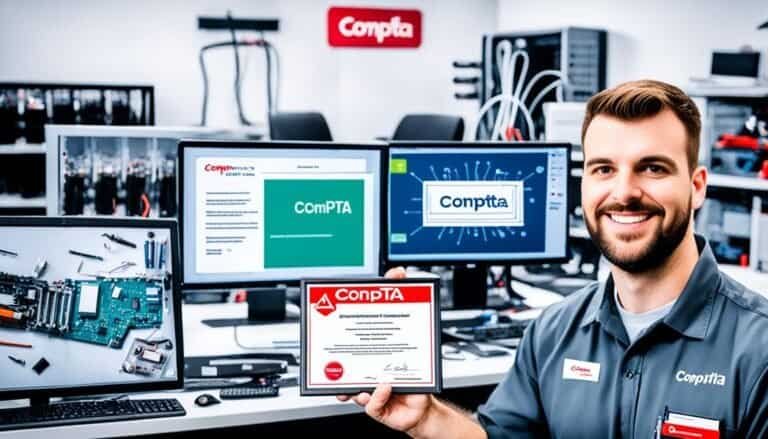Certified Information Technology Professional (CITP)
Did you know that having a Certified Information Technology Professional (CITP) certification can significantly enhance your IT career? With the ever-growing demand for skilled technology professionals, the need for recognized IT credentials is more important than ever before.
The CITP certification is a specialized IT certification that acknowledges technical expertise across various areas of business-technology practice. It provides recognition for professionals in the field of Information Technology, showcasing their proficiency in technology in the context of financial reporting.
Key Takeaways:
- Obtaining a CITP certification can give your IT career a significant boost.
- The CITP certification is a prestigious credential that recognizes expertise in various areas of business-technology practice.
- IT professionals with a CITP certification are highly sought after in the industry.
- The CITP certification demonstrates proficiency in technology within the context of financial reporting.
- By earning the CITP certification, you can gain access to new career opportunities and advance your professional development.
CITP Credential Eligibility and Examination
To be eligible for the CITP credential, individuals must meet specific requirements and successfully complete the CITP examination.
CITP Credential Eligibility
CPAs who are members of the American Institute of CPAs (AICPA) are eligible to pursue the CITP credential. Additionally, individuals must hold a valid and unrevoked CPA license or certificate issued by a state authority. A minimum of 1,000 hours of relevant business experience in the last five years, aligned with the CITP Exam Content Specification Outline (CSO), is also required.
Members of other professional organizations who have already passed ISACA’s Certified Information Systems Auditor (CISA) certification exam may be eligible for a waiver of the CITP examination requirement.
CITP Examination
The CITP examination is a comprehensive assessment of an individual’s knowledge and skills in the field of information technology and financial reporting. The four-hour exam consists of 160 multiple-choice questions that cover various topics related to the CITP Exam Content Specification Outline (CSO).
The CITP examination can be taken in two formats:
- Online: Candidates can take the exam online in a remote-proctored environment, offering convenience and flexibility.
- In-person: The exam is also available at designated test center locations across North America for those who prefer a traditional testing environment.
Successful completion of the CITP examination is a crucial step in earning the CITP credential and demonstrating proficiency in the intersection of technology and financial reporting.
Exam Registration and Format
Candidates interested in taking the CITP examination can register through the AICPA website. The registration process is straightforward and includes providing necessary personal and professional information.
The CITP exam format consists of multiple-choice questions, each with four answer choices. Candidates are required to select the most appropriate answer based on their knowledge and understanding of the subject matter.
Upon completion of the exam, candidates will receive their scores and information on how to access their score report. The score report provides detailed feedback on performance in each content area covered in the exam, offering valuable insights for further improvement.
CITP Exam Content
The CITP exam content is based on the CITP Exam Content Specification Outline (CSO), which outlines the key knowledge areas covered in the examination. The CSO includes the following content areas:
| Content Areas | Percentage of Exam |
|---|---|
| Information Security and Cybersecurity | 20% |
| Data Analysis and Business Intelligence | 20% |
| IT Governance and Controls | 20% |
| Information Management | 20% |
| Systems, Applications, and Technology | 20% |
The exam questions are designed to assess candidates’ understanding of these key areas and their ability to apply their knowledge in real-world scenarios.
CITP Exam Preparation
Preparing for the CITP exam is essential for aspiring IT professionals looking to earn this prestigious certification. The CITP Exam Self-study Review Course offered by the AICPA is a comprehensive resource designed to align with the CITP Exam Content Specification Outline (CSO). This self-study course covers a wide range of exam content areas, including information security, cybersecurity, business intelligence, data management, and IT governance. It provides candidates with the necessary knowledge and skills to excel in the technology-driven marketplace.
The CITP Exam Self-study Review Course includes illustrative examples and explanations that help candidates understand complex concepts and apply their knowledge effectively. By leveraging practical scenarios and real-world applications, this review course prepares candidates to tackle the challenges they may encounter in their IT careers.
In addition to the self-study review course, candidates can also benefit from the CITP Learning Pathway. This three-part education series covers the entire body of knowledge required for the CITP credential. The learning pathway is divided into modules that focus on specific areas such as information security and cyber risk, business intelligence and data management, and IT governance and controls.
Completing the CITP Learning Pathway equips candidates with the essential IT skills and competencies needed to succeed in the CITP exam. It provides a structured approach to studying the different content areas and ensures candidates have a comprehensive understanding of the topics assessed in the exam.
Overall, the combination of the CITP Exam Self-study Review Course and the CITP Learning Pathway offers a robust exam preparation program that prepares candidates to confidently address the exam content areas. By acquiring the necessary IT skills and competencies, candidates can increase their chances of achieving success in the CITP exam and obtaining the highly regarded CITP certification.
| Exam Preparation Resources | Features |
|---|---|
| CITP Exam Self-study Review Course |
|
| CITP Learning Pathway |
|
CITP Body of Knowledge
The CITP credential is based on a comprehensive body of knowledge that covers various domains relevant to IT professionals. This body of knowledge includes topics such as information security governance, cybersecurity risk management, SOC for cybersecurity, data management, data analysis and reporting, business intelligence management, IT governance and strategy, IT risks and controls, and system and organization controls reporting.
- Information Security Governance: Understanding and implementing effective information security governance practices to protect organizational information assets and manage cybersecurity risks.
- Cybersecurity Risk Management: Identifying and assessing cybersecurity risks, developing risk mitigation strategies, and implementing cybersecurity controls to protect against potential threats.
- SOC for Cybersecurity: Understanding and applying the standards and principles of System and Organization Controls (SOC) reporting for cybersecurity to assess the effectiveness of an organization’s cybersecurity program.
- Data Management: Managing the lifecycle of data, including data collection, storage, retrieval, and disposal, while ensuring data integrity, privacy, and compliance with relevant regulations.
- Data Analysis and Reporting: Utilizing data analysis techniques to extract meaningful insights from large datasets, and effectively communicating the findings through reporting and visualization.
- Business Intelligence Management: Leveraging business intelligence tools and techniques to gather, analyze, and present data-driven insights for strategic decision-making.
- IT Governance and Strategy: Designing and implementing IT governance frameworks and strategies to align IT efforts with organizational goals and facilitate efficient and effective IT resource management.
- IT Risks and Controls: Identifying, assessing, and mitigating IT risks through the implementation of appropriate controls and risk management frameworks.
- System and Organization Controls Reporting: Understanding and applying the principles and requirements of system and organization controls reporting to assess the effectiveness of controls related to financial reporting, IT operations, and compliance.
The CITP credential equips IT professionals with a broad range of knowledge and skills in these domains, allowing them to navigate the complex landscape of technology and finance. Mastering these areas not only demonstrates expertise but also enables professionals to contribute to the development and implementation of robust IT strategies and systems within their organizations.
Qualifications for the CITP Credential
To obtain the prestigious Certified Information Technology Professional (CITP) credential, candidates must demonstrate comprehensive knowledge in various areas covered by the CITP Body of Knowledge. These areas encompass:
- Risk assessment: Understanding and assessing potential risks to an organization’s information systems and infrastructure.
- Fraud considerations: Recognizing and addressing fraud risks in technology-driven environments.
- Internal controls and information technology general controls: Implementing and evaluating controls to ensure the integrity and security of information systems.
- Evaluate, test, and report: Assessing and reporting on the efficacy of information systems and controls.
- Information management and business intelligence: Utilizing technology to manage and analyze data for informed decision-making.
- Technology strategic planning: Developing IT strategies aligned with organizational goals and objectives.
- IT architecture, business process enablement, system development, acquisition, implementation, and project management: Overseeing the full lifecycle of IT initiatives, ensuring successful outcomes.
- Information systems management: Managing and maintaining information systems to meet organizational needs.
- Systems security: Implementing safeguards and controls to protect information systems from threats.
- IT governance and regulation: Complying with regulatory requirements and establishing effective IT governance frameworks.
Qualification requires passing a formal exam that evaluates candidates’ knowledge and understanding of these areas. The exam ensures that CITP holders possess the necessary expertise to navigate the complex landscape of technology and its impact on financial reporting.
Image:
CITP Multiple Entry Point System (MEP)
The Certified Information Technology Professional (CITP) program has an inclusive Multiple Entry Point System (MEP) that assesses candidates based on their business experience and lifelong learning achievements. This points-based system determines eligibility for the CITP credential, a prestigious certification in the field of Information Technology.
To qualify for the CITP credential, candidates must accumulate a minimum of 100 total points. These points are earned through two categories: business experience and lifelong learning activities. Both categories carry specific minimum and maximum point requirements.
Business Experience Requirement:
The business experience requirement focuses on the candidate’s relevant work experience in the field of IT. A minimum of 25 points must be earned in this category, with a maximum of 60 points available for eligible experience. Candidates must provide supporting documentation to demonstrate their qualifications and the alignment of their experience with the CITP Exam Content Specification Outline (CSO).
Lifelong Learning Requirement:
The lifelong learning requirement recognizes candidates’ commitment to continuous professional development and staying updated with the latest advancements in the IT industry. Candidates can earn a minimum of 25 points and a maximum of 60 points in this category through various learning activities such as attending relevant conferences, completing specialized courses, publishing articles or research papers, and participating in workshops or webinars.
Supporting Documentation:
Candidates must provide supporting documentation for both the business experience and lifelong learning categories. This documentation serves as evidence of their qualifications and ensures the credibility of their point accumulation. It is essential to carefully review the documentation requirements provided by the CITP program to ensure compliance and a successful application.
Accumulating points through the CITP MEP is a crucial step towards earning the CITP credential, demonstrating a candidate’s proficiency in the field of Information Technology and their commitment to lifelong learning.
| Category | Minimum Points | Maximum Points |
|---|---|---|
| Business Experience | 25 points | 60 points |
| Lifelong Learning | 25 points | 60 points |
Benefits of the CITP Credential
The Certified Information Technology Professional (CITP) credential offers numerous benefits to IT professionals. Holding the CITP credential provides instant recognition as a professional who understands the intersection of technology and financial reporting, showcasing specialized skills and expertise.
One of the key benefits of the CITP credential is the confidence it instills among employers and clients. With this credential, IT professionals demonstrate their proficiency in areas such as information security, business intelligence, and IT governance, giving stakeholders peace of mind and trust in their abilities.
Moreover, CITP credential holders gain access to a wide range of professional development resources, allowing them to continuously enhance their knowledge and skills. This ongoing learning ensures that CITP professionals stay up to date with the latest industry trends and advancements, positioning them as experts in their field.
The CITP credential also opens up networking opportunities, connecting professionals with a community of like-minded individuals. Engaging with peers and experts in the IT industry nurtures collaboration, knowledge sharing, and potential career growth.
CITP professionals enjoy premium benefits and resources, including discounts on AICPA conferences, events, and certificate programs. These exclusive offerings provide further avenues for learning and staying connected with industry leaders and emerging technologies.
Overall, the benefits of the CITP credential extend beyond professional recognition. It empowers IT professionals to increase their expertise, enhance their career prospects, and contribute to the ever-evolving landscape of technology and financial reporting.

| Benefits | Description |
|---|---|
| Recognition | Instant recognition as a technology professional with expertise in financial reporting. |
| Confidence | Instills confidence among employers and clients, showcasing specialized skills and knowledge. |
| Expertise | Demonstrates proficiency in areas such as information security, business intelligence, and IT governance. |
| Professional Development | Access to resources and learning opportunities for continuous growth and staying up-to-date. |
| Networking Opportunities | Connects professionals with a community of like-minded individuals for collaboration and career advancement. |
| Premium Benefits and Resources | Discounts on AICPA conferences, events, and certificate programs, expanding knowledge and staying updated. |
Oversight of the CITP Credential
The administration and oversight of the CITP credential is carried out by the American Institute of CPAs (AICPA) through the National Accreditation Commission. This ensures that the credential maintains its rigorous standards and remains relevant in the evolving field of technology and finance.
A volunteer committee, consisting of six members serving staggered three-year terms, plays a crucial role in the oversight of the CITP credential. This committee is responsible for reviewing applications, ensuring compliance with the credential’s requirements, and monitoring the maintenance of competency by credential holders.
The oversight process ensures that the CITP credential upholds its reputation as a mark of excellence in the IT industry. Through diligent review processes and continuous monitoring, the committee ensures that only qualified individuals who meet the stringent criteria are awarded the CITP credential. This provides employers and clients with the confidence that the credential holders possess the requisite knowledge and skills.
Key Responsibilities of the Volunteer Committee
The volunteer committee, appointed by the AICPA, has the following key responsibilities:
- Reviewing CITP credential applications to ensure they meet the eligibility criteria.
- Assessing the qualifications and experience of applicants.
- Ensuring compliance with the CITP credential requirements and standards.
- Monitoring the ongoing competency and professional development of CITP credential holders.
The committee’s dedication and commitment to maintaining the integrity and value of the CITP credential contribute to its recognition as a trusted certification in the IT industry.
Overview of CITP Credential Oversight
| Organization | Role |
|---|---|
| American Institute of CPAs (AICPA) | Administering body of the CITP credential |
| National Accreditation Commission | Oversees the CITP credential |
| Volunteer Committee | Responsible for reviewing applications and monitoring credential holders |
The volunteer committee’s collective expertise and commitment to maintaining the highest standards in the IT industry make them an essential part of the CITP credential’s oversight process. Their diligent efforts contribute to the credibility, relevance, and value of the CITP credential.
Conclusion
The Certified Information Technology Professional (CITP) credential is a prestigious certification that recognizes the technical expertise and specialization of IT professionals in areas such as information security, cybersecurity, business intelligence, and IT governance. With the CITP credential, IT professionals can unlock a world of career advancement opportunities and gain professional recognition in the industry.
The CITP credential offers a multitude of benefits to its holders. It not only validates their proficiency in the intersection of technology and financial reporting but also provides access to a community of like-minded professionals. This community offers networking opportunities, collaborative learning, and a platform for shared experiences.
By attaining the CITP credential, IT professionals demonstrate their commitment to continuous professional development and growth. It showcases their dedication to staying current with industry trends and advancements. The CITP credential serves as a valuable asset, enabling IT professionals to enhance their careers, gain credibility, and open doors to exciting opportunities in the IT field.
FAQ
What is the Certified Information Technology Professional (CITP) certification?
The CITP certification is a prestigious IT certification that provides recognition for professionals in the field of Information Technology. It acknowledges technical expertise across various areas of business-technology practice.
Who is eligible for the CITP credential?
To be eligible for the CITP credential, individuals must be Certified Public Accountants (CPAs) and members of the American Institute of CPAs (AICPA). They must also hold a valid and unrevoked CPA license or certificate issued by a state authority.
What are the requirements for the CITP examination?
Candidates must have a minimum of 1,000 hours of business experience in the last five years aligned with the CITP Exam Content Specification Outline (CSO). The CITP Examination consists of 160 multiple-choice questions and must be completed within four hours.
How can I prepare for the CITP exam?
The AICPA provides a comprehensive CITP Exam Self-study Review Course that covers the topics included in the exam. Additionally, the CITP Learning Pathway, a three-part education series, can equip candidates with the necessary skills and competencies for success.
What is covered in the CITP Body of Knowledge?
The CITP Body of Knowledge includes domains such as information security governance, cybersecurity risk management, SOC for cybersecurity, data management, business intelligence management, IT governance, IT risks and controls, and system and organization controls reporting.
How can I qualify for the CITP credential?
Candidates must demonstrate comprehensive knowledge in the areas covered by the CITP Body of Knowledge. This can be achieved through a formal exam that assesses their understanding of topics such as risk assessment, fraud considerations, internal controls, information management, technology strategic planning, and more.
How does the CITP Multiple Entry Point System (MEP) work?
The CITP MEP is a points-based system that determines eligibility for the CITP credential. Candidates must accumulate a minimum of 100 total points, which includes points earned for business experience and lifelong learning activities within the five-year period preceding the application.
What are the benefits of obtaining the CITP credential?
Holding the CITP credential provides recognition and instills confidence among employers and clients. CITP credential holders also have access to professional development resources, networking opportunities, and premium benefits. They can enjoy discounts on AICPA conferences, events, and certificate programs.
Who administers and oversees the CITP credential?
The AICPA administers and oversees the CITP credential through the National Accreditation Commission. A volunteer committee is responsible for the credential’s oversight, ensuring that it maintains rigorous standards and stays relevant in the evolving field of technology and finance.







